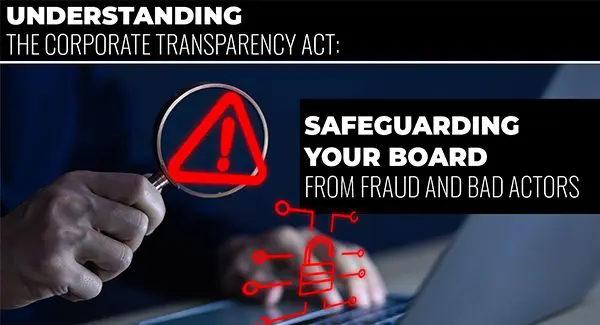- Legal Updates, Board Member 101
The Corporate Transparency Act (CTA) is a new federal law that mandates that certain businesses disclose ownership information to the U.S. Department of the Treasury’s Financial Crimes Enforcement Network (FinCEN). The primary goals of the CTA are to increase business transparency and accountability in an effort to prevent illegal financial activities such as fraud, money laundering, and tax evasion.
What Does the CTA Mean for Community Association Board Members?
Under the CTA, certain condominium, homeowner (HOA) and townhome community associations will be required to report detailed information about their board members to the Financial Crimes Enforcement Network (FinCEN). Current board members of these associations are considered “beneficial owners” under the CTA.
Consequently, board members must provide FinCEN with detailed personal information, including their legal name, date of birth, residential address, and a copy of a valid, unexpired government-issued identification.
While this effort aims to increase transparency, it also introduces a new set of challenges. One of the most increasing concerns is the potential for fraud, particularly as bad actors may seek to exploit board members who are unfamiliar with the CTA’s requirements and penalties for noncompliance.
As specified in the Corporate Transparency Act:
- “…a person who willfully violates the BOI reporting requirements may be subject to civil penalties of up to $500 for each day that the violation continues.
- A person who willfully violates the BOI reporting requirements may also be subject to criminal penalties of up to two years imprisonment and a fine of up to $10,000.
- Potential violations include willfully failing to file a beneficial ownership information report, willfully filing false beneficial ownership information, or willfully failing to correct or update previously reported beneficial ownership information.”
Beware of Fraud: Protecting Your Board from Bad Actors
As community association board members strive to comply with the CTA, they must remain vigilant against potential fraud. Scammers may pose as legitimate entities or government officials, seeking to obtain Personally Identifiable Information (PII) under the guise of assisting with CTA compliance.
The consequences of falling victim to such fraud can be severe, including identity theft, financial loss, and legal repercussions for board members who do not comply with the CTA.
Best Practices and Safeguards for Board Members
To protect your board and association from fraud and bad actors, consider implementing the following best practices:
- Educate Your Board: Ensure that all board members understand the CTA, requirements associated with compliance, and how to recognize potential scams.
- Verify Communication Sources: Before sharing any PII or sensitive information, verify the identity of the requester and be wary of unsolicited requests from unknown third parties.
- Consult with the Association’s Attorney: Work with your community association’s legal counsel to ensure that compliance aligns with this new law’s requirements and that you have appropriate safeguards in place when it comes to collecting information/documentation.
Below are two KSN educational resources that further address the Federal Corporate Transparency Act (CTA):
Article – Federal Corporate Transparency Act: Impact on Community Associations https://www.ksnlaw.com/blog/federal-corporate-transparency-act-impact-community-associations/
Video – Corporate Transparency Act: Impact on Community Associations (13 mins.) https://brainyboard.com/programs/brainyboardcta-540758?category_id=172711
Legal Resource
The Corporate Transparency Act introduces new responsibilities for community association board members. However, by staying informed and adopting best practices, you can protect your association from fraud and ensure compliance with confidence.
Since 1983, KSN has been proud to assist thousands of community associations throughout the United States. In preparation to comply with the CTA, our law firm has invested significant time and effort into protecting our clients’ private information using high-grade encryption.
KSN is prepared to assist board members in navigating the CTA’s requirements and deadlines by:
- Preparing and filing the correct documentation with the U.S. Department of the Treasury within the required reporting timeframe.
- Providing proper board member personal identification to the U.S. Department of the Treasury in a secure manner.
- Updating the U.S. Department of the Treasury when there are changes to your community association’s board (e.g., following annual elections or when a board member moves, etc.).
Contact our law firm if you have questions regarding the CTA’s impact to your community association, reporting deadlines, and required board member personal information and documents that must be submitted to the U.S. Department of the Treasury.
KSN can assist in preparing the documentation that complies with the CTA including protocols to promptly learn about any changes to the association’s “beneficial owners” and/or updates to their Personally identifiable information (PII) that must be submitted within the required reporting timeframe.
You can reach KSN by calling 855-537-0500 or visiting our website at www.ksnlaw.com.
Since 1983, KSN has been a legal resource for condominium, homeowner, and townhome associations. Additionally, we represent clients in real estate transactions, collections, landlord/tenant issues, and property tax appeals. We represent thousands of clients and community associations throughout the US with offices in several states including Florida, Illinois, Indiana, and Wisconsin.
Please note the material contained in this article is for educational and informational purposes only and does not constitute legal advice. No attorney-client relationship is established by your review or receipt of the information contained in this article. You should not act on the information discussed in this article without first obtaining legal advice from an attorney duly licensed to practice law in your State. While KSN has made every effort to include up-to-date information in this article, the law can change quickly. Accordingly, please understand that information discussed in this article may not yet reflect the most recent legal developments. Material is not guaranteed to be correct, complete, or up to date. KSN reserves the right to revise or update the information and statements of law discussed in the article law at any time, without notice, and disclaims any liability for your use of information or statements of law discussed on the article, or the accessibility of the article generally. This article may be considered advertising in some jurisdictions under applicable law/s and/or ethical rules/regulations. © 2024 Kovitz Shifrin Nesbit, A Professional Corporation.



